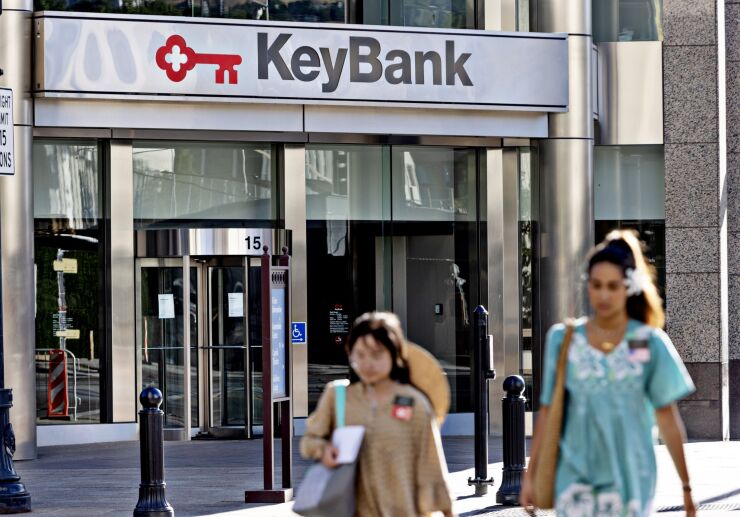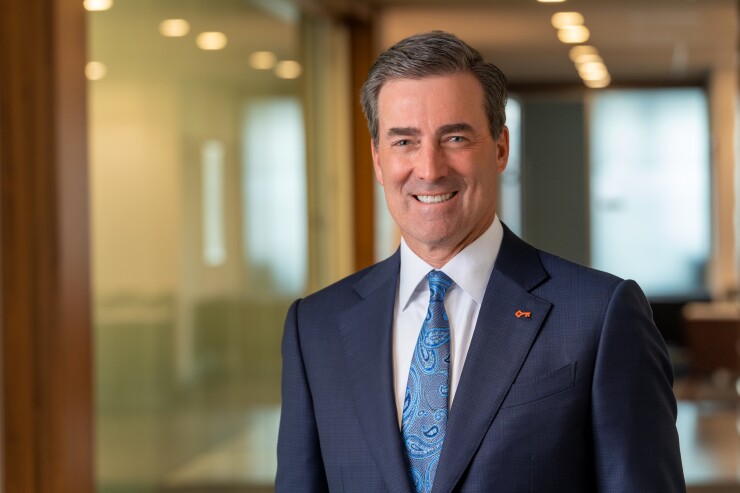
Cleveland-based KeyCorp is shrinking its balance sheet to fit what Chairman and CEO Chris Gorman predicts will be meaningfully lower expectations for large banks' loan-to-deposit ratios.
"I think loan-to-deposit ratios for [banks with more than $100 billion in consolidated assets], if they are in the mid-80s now they're going to be significantly less, and we're very focused on this," Gorman said Thursday on a conference call with analysts.
Key's loan-to-deposit ratio was 83% on June 30, down from 84.4% three months earlier.
Cleveland-based KeyCorp, the holding company for KeyBank, began the year with expectations of growing loans as much as 9%, but changed course after a tumultuous spring that saw the closure or failure of four major banks. "We not only stopped that growth but actually pushed it back by $1 billion" through the end of the second quarter, Gorman said. "Right now, what we're doing is we're scrutinizing every portfolio we have in the bank."

As part of the reduction efforts, the $178.8 billion-asset Key will look to eliminate what Gorman characterized as "standalone loans" that "don't return their cost to capital."
"If you think about having to carry more capital, and you think about the capital you have [being] a lot more expensive, then you can rest assured there will be a lot of credit-only relationships that won't be strategic to us," Gorman said.
Going forward, Key won't necessarily scale back loan originations. What it will seek to do is securitize and sell more loans made to noncore borrowers, Chief Financial Officer Clark Khayat said on the call. Key plans to be "more of a fee, advice and core banking generator than a loan shop," Khayat said.
Though Gorman didn't draw an explicit connection, banking regulators are expected to unveil a series of rules in the coming weeks and months that some experts believe will leave many large financial institutions with
For Key, talk of a smaller balance sheet came amid a challenging second-quarter earnings report. Net income declined 50% year over year to $250 million, prompting Gorman to label the company as "under-earning."
Gorman was quick to add he expects Key's earnings picture to brighten considerably in 2024 and 2025, as a portfolio of short-term swaps and Treasuries that reduced net income by $340 million for the quarter ending June 30 reprices. "What we really need is the position that we have — which is, liability sensitive at a time when you wouldn't want to be liability sensitive — we need for that to burn off, and the passage of time will do a lot on that," Gorman said.
The National Credit Union Administration voted unanimously to make it easier for boards of directors to ban problematic members.
According to Gorman and Khayat, the repricing process will result in approximately $225 million of extra quarterly net interest income beginning in 2025.
Key's swap and Treasury issues, along with increased funding costs, led to an 11% year-over-year drop in second-quarter spread revenue, which totaled $986 million. Lackluster investment banking fee income, which fell 20% to $120 million, played into a 12% year-over-year decline in noninterest income.
Gorman said he felt confident investment banking income would pick up during the second half of 2023. "People will defer transactions so long," Gorman said. "Eventually the logjam starts to break."
For the remainder of 2023, Key's earnings engines will be running closer to neutral than high gear. Khayat predicted further modest declines in net interest income in both the third and fourth quarters. Key's net interest margin declined by 35 basis points during the quarter to 2.12% at June 30. Though Khayat forecast a relatively flat third quarter with the margin trending up in the final three months of 2023, some analysts still expressed surprise at the second-quarter number.
"It's such a slim margin here," Wells Fargo Securities' Mike Mayo said on the call.
Brian Foran, who covers Key for Autonomous Research, likened Key's earnings report to a bad-news-before-good-news narrative, but the numbers might not merit the positive spin, Foran added.
"This one feels like a much bigger earnings reset than peers," Foran wrote Thursday in a research note. "Like it's just bad-news-is-bad-news."






